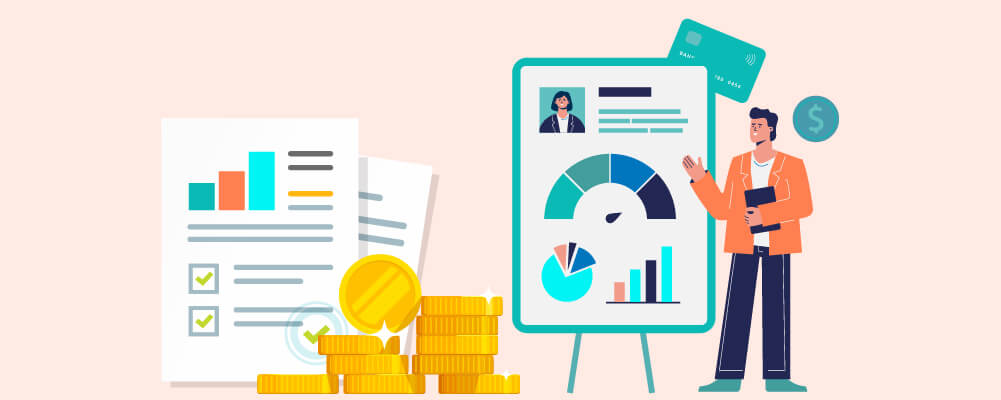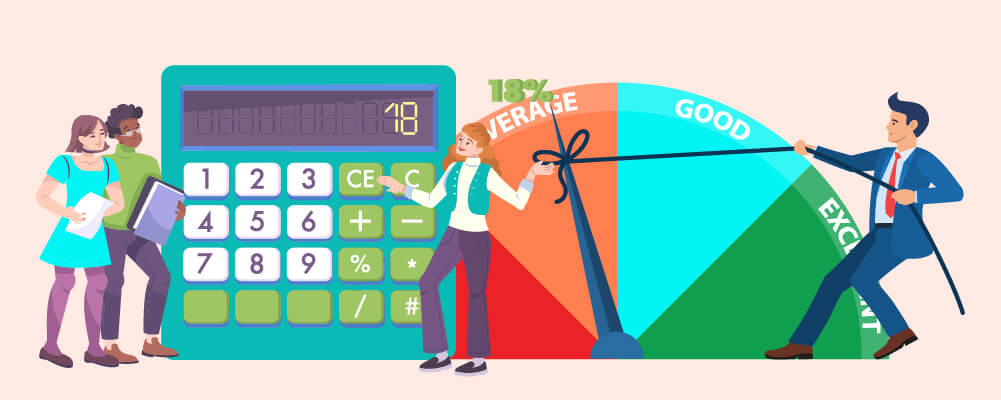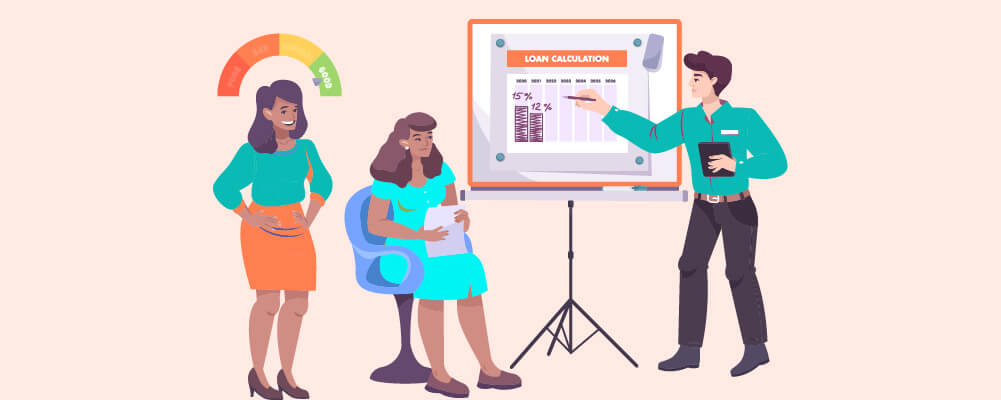Your credit score is the key to financial strength. It can help you qualify for loans, bring down high-interest rates and set you up for a smooth sailing financial future.
However, if your credit score is bad, you can expect the opposite; rejections from loans, high-interest rates that keep you in debt for longer, and the inability to move forward with your life.
Good credit scores aren’t something you are born with or given; it’s a reflection of how you use money. With the proper guidance, anyone can turn their low score into a high one, granting you access to a better financial future.
What's Ahead...
Table of Contents
What Is A Credit Score?

Before we explain how to improve your credit, you need to have a tight grasp on what it is. If we start you off without this background knowledge, you can easily fall back into those dreaded low numbers.
A credit score is a numbers-based scale that shows lenders how likely you are to pay back a loan.
Leaders are the people who allow you to borrow money. They can be banks, building societies, shops, or anything that gives you credit. The most common forms of credit are credit cards, loans, and store credit.
The score itself is created using your financial history. This doesn’t mean how much money you have, instead, the algorithm looks at how good you are at paying your debts.
The typical factors in a credit score are:
- Your bill-paying history
- Your credit and debit card history
- Your unpaid debts
- The number of accounts and loans you have open
- The length of your open loans
- The amount of credit you are using
- Your bankruptcy, foreclosure, or debt collection history
Your credit score starts as soon as you are connected to finances. This is normally through a bank account. Then when you start to develop bills (like a phone bill), your credit score will build.
If you go into your overdraft or pay your phone bill late, this will be reflected in your credit score.
If you don’t borrow money, then your credit score will be low. This is because the lenders have no evidence of how you can handle credit.
Your credit score will change and reflect your financial abilities, without any active input from you.
When you are ready to ask for a loan, need a credit card, or require a mortgage, the lender will pull up this pre-built credit score. This is usually the first step any lender takes because if your number is low, they already know you are a risky borrower.
Understanding Your Credit Score

Now you know what a credit score is, it’s time to explain how it is created. Knowing how the algorithms function will help you understand how to improve your own score.
In this section, we will be discussing credit bureaus. These are companies that create your credit score. There are multiple different credit bureaus, some of which will offer your credit score for free.
Your Total Credit Score
Don’t be surprised if one credit bureaus gives you a different score from another. Unfortunately, there isn’t one universal system to measure your credit. That being said, they all use very similar methods. The difference comes from differing priorities.
For example, one credit bureau may put more interest into how big your debt is, while another may focus on how quickly and efficiently you repay your debts.
Each bureau will use a three-digit number, ranging from 300 to 850.
Lenders will most likely be looking at multiple different credit bureaus to create a rounded picture of your financial situation.
Your Credit Report
Your credit report is what creates your credit score. Most bureaus will show your credit score for free but may require a charge to view your credit report.
There are tens of bureaus in the United States, but the most commonly used are TransUnion, Experian, and Equifax.
Each of them will create a different score using your report, and most lenders will look at these three to understand your financial abilities. If you want to see what the lenders are seeing, we suggest using one or all three of these lenders.
Your report will include all of the information listed above as well as identification information such as your name, address history, date of birth and Social Security number.
However, your report will not include information such as:
- Your salary
- Your employment history
- Your spending habits
Although the report will not include this information, your potential lenders may request it.
Top Factors That Impact Your Credit Score
There are 5 main factors that affect your credit score, and each carries its own weight.
We will walk you through each one, starting with the most important to the lesser important factors.
1. Payment History
Almost every lender will agree that your payment history is the most important factor in your financial record. It shows how reliable you are when it comes to on-time repayments, and therefore how much of a risk you are.
Just one late payment to a bill or bank can dramatically affect your score. And if you’ve missed or paid late twice or more in a 90 day period, your score will drop even lower. This is because you are showing a lingering pattern of risk.
This is why it is immensely important to pay your bills on time, every time. An easy way to achieve this is to set up automatic payments. This way you will never pay late.
2. Debt-To-Limit Ratio
Also known as credit utilization, your debt-to-limit ratio reflects how much of your credit card limit you use. For example, if your credit card limit is $5,000, and you use roughly $500 on average a month, then your ratio is approximately 10%.
Ideally, your ratio should be lower than 30% overall. That means dividing all of your credit card debts by their limits to create the overall ratio.
For example, let’s say you have one credit card with a $5,000 limit, another with a $10,000 limit, and a third with a $1,000 limit. Each account owes $800. This will make your individual ratios 16%, 8%, and 80%, respectively. But your total ratio will be 15%.
Although you have one account close to the limit, the combined debt-to-limit ratio is 15% which is under the recommended 30%.
If your credit ratio is too high, then it shows you may be overextending your financial reach, suggesting you are financially at risk.
3. Credit History
The first two factors often hold the most weight. That’s because they show how you are coping with your finances in recent months. However, your overall credit history can show your lifetime of financial stability.
A long credit history of on-time payments and low ratios show that you’re capable of using credit effectively. If you have a credit card open for a long period of time, it shows how you can balance and maintain your debts.
Ideally, you should keep your oldest credit card open to continually prove your long-standing financial stability. Closing an old credit card will cut your credit history’s potential length, stopping it from casually increasing your score each month.
4. Mix Of Credit Types
If you have multiple types of credit, then your credit score will improve. This is because you’ll be showing that you’ve been accepted and approved by multiple lenders.
The most common mixes are credit cards, mortgages, and student loans. This mixture by itself shows that you have been accepted for short borrowing, long borrowing, and financial boosting borrowing.
Paying towards these credit lines shows other lenders that you can stay on target for each company.
5. Credit Inquiries
This factor is the least important of the five, but it will still impact your score. When someone looks at your credit report (may it be a lender, insurer, landlord, etc.), your score will be lowered.
There are two types of inquiries; soft and hard.
Hard inquiries are when potential lenders are searching your credit report. They can only do this with your permission, and it shows them everything they need to know to approve or reject your application. However, a hard inquiry will lower your credit score as it shows you may need more credit.
This is why you should be confident in your credit score and the lender’s likelihood of accepting you before you apply for credit.
Soft inquiries are created when someone looks at your credit report for reasons other than applying for credit. A lender may ask for a soft report to offer a quote.
These inquiries do not dive deeply into your credit history, do not require permission from you, and do not affect your credit score.
A hard inquiry shouldn’t drop your credit score by more than a few points, however, if you apply to multiple credit lenders, these “few points” can easily snowball into a lowering score. This is because your dramatic search suggests you are desperate for a loan. Desperate borrowing is often a sign of risk.
Tips On How To Improve Your Credit Score

There are easy ways to help you improve your credit score that you can apply today. Each of these 5 tips are achievable in concept but might need active attention for you to achieve them every month.
Soon they will become as natural as breathing, but for now, bookmark this page and remind yourself monthly about these quick credit score improvement tips.
1. Build A Credit File
If you are just about to start your credit journey, then opening a new account in your name is the first step. You might be paying bills in principle by paying the account owner, but if your name isn’t on the account, too, then you won’t have a credit file.
To create a good file as you start off, you need to have a couple of accounts open and active.
If you have a low score or are just starting out, you should open a credit builder loan. These are loans with low credit limits, low-interest rates, and no annual fees. The idea is to help you build a positive credit file without borrowing too much money or putting the lender at risk.
If you are young or worried, then instead of having an account all to yourself, you could be added as a second account holder or authorized user. This is when someone else already has an account, and your name gets added to it.
In these situations, your credit score will increase with the positive interaction from the original account holder. At the same time, the original account holder can actively help you with your credit usage.
The original account holder will have to agree to the situation, and they will most likely be a friend, family member, or partner. They will be made aware that any missed payments or spending created by the new account holder (you) will affect both parties involved.
2. Don’t Miss Payments
As you now know, your payment history is the most important factor for your credit score. If you miss payments, it will dramatically decrease your score and have a long-lasting effect on your credit report.
A missed payment is when you don’t pay the minimum sum after 29 days of the request. On the 30th day, your missed payment will be added to your report, harming your score.
You will also be charged for the failure, and you will be at risk of an increased interest rate. This is because you are showing the lenders that you’re risking their money.
To avoid this dramatic turn of events, you should set up an automatic payment system using your lender’s online facilities. You can make your main bank account pay a set fee every month. Ideally, this fee should be more than the minimum payment to help reduce the overall debt at the same time.
If the reason for your missed payments is due to financial hardship, speak to your lender straight away. It might seem daunting telling the creditor that you’re struggling to pay, but they will have systems in place to help you get back on your feet. Remember that the lender wants their money back, so helping you stay afloat financially will be beneficial to them.
Depending on the situation and the reason for your financial hardship, your lender could offer you these suggestions:
- Delayed payment until income resumes
- Longer term time for a lower interest rate
- Frozen account until financially secure
A frozen account means you cannot use the credit, and the lender cannot charge you. This is normally added until the borrower can reach a state of stability.
Another way to avoid late payments popping up on your credit report is to consider low payment credits. These could be your gym membership, a subscription service, or something similarly minute.
Paying these credits on time will not affect your credit score dramatically, however, if these accounts go into the minuses and a debt collector comes for their due payments, then it will show up on your credit report.
Be aware of every account you own, keep track of their minimum payments and payments dates, and close down anything that hinders this process.
3. Catch Up On Past-Due Payments
A late payment will stay on your credit report for up to 7 years. After that 7 year point, your previous financial history will be removed. This is because who you were 7 years ago may not be who you are today. This removed history allows you to grow and develop into the responsible borrower you are.
To put you into that 7 years gap and allow yourself to remove those late payments fees, you need to start paying back those past-due payments.
This will stop your constant late fees and black marks on your credit report, getting you ever closer to a stable account. If you have lost sight of all of your accounts, or are having trouble managing your debt, then you should try talking to a credit counselor.
Credit counselors can help you manage your money; they could also talk to your lender and negotiate lower rates. If necessary, your counselor may suggest a debt management plan.
DMPs or debt management plans are voluntary and often free. The counselors guide you through your debts, talk to your creditors, and suggest mutually beneficial repair plans.
DMPs are a fantastic option for people who are struggling to get a handle on their finances. However, they will limit your access to the credit accounts. This is because they don’t want you to fall deeper into debt.
If you fail a DMP, then you are showing that even with guidance and volunteer help, you cannot manage your money. More serious steps might be taken, for example, bankruptcy.
4. Pay Any Revolving Balances
You might be scratching your head, wondering why your credit score is low even though you make your monthly payments and do so on time.
It could be that your debt-to-limit ratio is too high on your revolving balances. Revolving balances are accounts such as credit cards, which go up and down in available credit. For example, loans start off with a high balance, but as you pay each month, the overall balance is reduced. On a credit card, you use and pay back the credit constantly.
If your debt amount is close to your limit, you are showing lenders that you are heavily relying on your credit. It looks as though you are finding it hard to reduce your debt. Whether this is true or not is irrelevant; this is what the accounts are suggesting.
As we said before, your debt-to-limit ratio should be 30% or less.
However, the highest scores will have a debt-to-limit ratio of 9% or less. If you are already in the 30% or less category, try getting the ratio even lower. The lower you can go, the better your credit score will be.
5. Limit How Often You Open A New Account
This might seem contradictory to our previous tip, but you should try to limit the number of new accounts you apply for. While you need to open an account to get a credit score, to begin with, every time you apply for a new account, a lender will make a hard inquiry to assess your credit history.
We have talked about hard inquiries before, but the issue bears repeating. A hard inquiry is when a lender looks into your credit history to understand your financial situation. They need to do this to give you a realistic rate.
One inquiry won’t be enough to ruin your credit score; however, the more lenders that are looking at your credit report, the more it will seem like you are desperate for a loan. Each time your score will go down, creating a compounding effect on your score.
If you have 5 or 10 lenders making hard inquiries, this could be enough to dramatically drop your credit score into a low bracket.
The same thing happens when you open a new account. When your account is opened, the credit score will drop. This is because you have shown that you need credit and could be a risk. However, with a month or two of on-time payments, your credit score will go back up to its high number. This is because you will have proven your ability to repay.
The credit score is meant to show lenders your level of risk, so don’t be surprised if, during your application process, the numbers change. They can always go back to a high number, and a low score won’t last forever.
Rebuilding A Credit Score
Unfortunately, there is no set time scale for rebuilding your credit score. It all depends on what has hurt it, to begin with.
For example, if you have an unlucky turn of events and miss one payment from your credit card, this will lower your credit score. However, if that only happened once, your score could be repaired after a year.
But, if you fail to make repayments twice or more, all within a 90 day period. Then it could take the whole 7 years before your score can recover. If the late payments result in repossession, then the situation could last even longer.
Nothing lasts forever though, even if you declare bankruptcy, this negative mark against your name will be removed after 10 years. Time is the best repairer of a credit score.
In the meantime, follow the positive steps suggested above.
How To Maintain A Good Credit Score

Building up and repairing your credit score is one thing, but once you’ve reached those healthy high numbers, you need to maintain them.
Luckily, maintaining your credit score is a lot easier than getting yourself out of debt.
Still, you should follow these 5 steps to help you stay on top of your credit.
1. Pay Your Bills On Time
We have said this constantly throughout the article, but we cannot express just how important paying on time is. Paying your bills with at least the minimum payment and on or before the due date will stop any of those late payment black marks.
This doesn’t just apply to your credit cards or loans either. You should be including every bill and every credit payment in this category.
Keeping on top of your payments is the easiest way to maintain your good credit score. Use automatic payments to help you accomplish this.
2. Do Not Get Close To Your Credit Limit
If you can get your balance to $0, then you’ll be doing the best you can for your credit score. Ideally, you should get to $0 right before your due date. This way, your accounts will be low on the next month, resulting in a higher credit score for that month.
If you cannot get down to $0, then keep an eye on your credit card limits. Remember that we want the debt-to-limit ratio to be 30% or lower.
To figure out your ratio follow this formula:
Balance On All Accounts / Limit Of All Accounts = Total Debt-To-Limit Ratio
3. A Long Credit History Helps Your Score
When you open a credit card, your lender will send updates to your credit score. When you close an account, these updates stop.
If you have had your credit card for a long period of time, you will have a long history of your financial abilities. This could include 20 years of on-time payments. This type of record shows that you are extremely stable financially. The strong stability will, in turn, lower your interest rates.
To keep your score high, you need to maintain these long-term credit cards. The card might have a low value or even be untouched by you as you prefer cards with better incentives; however, keeping this older card open is what’s driving a long and detailed positive history.
If you were to close down this account, nothing would happen instantly. However, after 10 years, this card will be removed from your credit history. With this long-standing history gone, your credit score will decrease due to the lowered evidence of your good financial history.
This will also reduce your available credit. For example, let’s go back to the above $5,000, $10,000, and $1,000 credit cards from earlier.
At this point, your total borrowing limit is $16,000.
If you decide to close your $5,000 account, your borrowing limit will be reduced to $11,000. As you are trying to keep your limit below 30%, this reduces your spending capacity by $1,500.
4. Watch Your Credit Report
Even if you do everything right, that doesn’t mean you’ll automatically have a great credit score. Unfortunately, errors can happen.
To make sure your credit score shows a realistic and accurate version of your history, you should keep an eye on your credit report.
For example, say you rented a house with someone as a student and had a joint account with them for that purpose. When you moved out, you closed down this account – or so you thought.
5 years later you realize your credit score has dipped, and you have a black mark for two late payments. You check your accounts and see no such issue. After talking to your credit bureau, it seems that your old student account is still open and that old friend has defaulted on their accounts.
Knowing this, you can close down the old student account and ask for the bureau to consider removing the mark as you are not connected to this person anymore. The error could then be removed, and you can continue with your good credit score.
5. Only Apply For Credit When You Need It
You want to avoid hard inquiries, but you also want to avoid looking risky in general. Having multiple lines of credit will tell a lender that you are living above your income. This suggests you are a risky borrower.
If you don’t need the loan, then don’t apply for one. If you can, pay for things with your money and not credit. If you need a line of credit as your savings don’t cover the item you want to purchase (like a car or home, for example), then do so sparingly.
You should also try to leave time between your latest application and your next one. The more time you leave, the better your credit score will be.
Summary

The best way to improve your credit score is to pay your bills, loans, and credit cards on time. Not only should you pay on time, but you should also pay the minimum amount at least.
Secondly, you should keep your old credit cards open to show your long credit history.
Next, you should keep on top of your debts, aiming to have less than a 30% debt-to-limit ratio at the end of the month.
To maintain a good credit score, you should continue with these methods but also keep an eye on your credit report. This way, you can spot mistakes before they become an issue.
Paul Martinez is the founder of BendingDestiny.com. He is an expert in the areas of finance, real estate, and eCommerce.
Join him on BendingDestiny.com to learn how to improve your financial life and excel in these areas. Before starting this blog, Paul built from scratch and managed two multi-million dollar companies. One in the real estate sector and one in the eCommerce sector.


